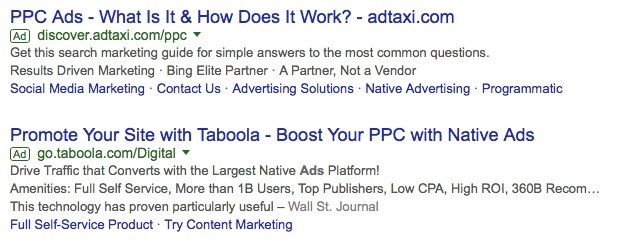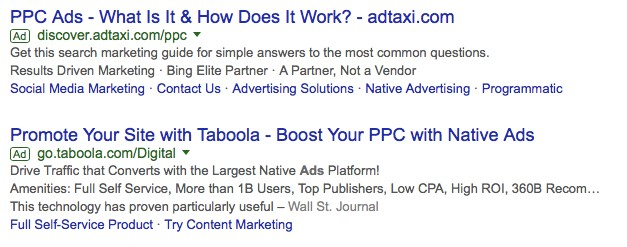Whether you’re a newbie or a seasoned vet, determining if you should use search advertising or display advertising for your marketing campaign is tough.
Use the wrong channel and you potentially ruin the maximum success of your whole campaign.
Thankfully, there are ways to decide which is the best for your business and which will generate the most conversions.
Display advertising
Display advertising is everywhere online. Every website you visit has ads that showcase products for sale. But have you ever noticed you keep seeing the same ads on your social media feeds and the like?
That’s because display advertising tracks a user’s behavior in order to put the right ads in front of the right customers. Display ads are also sometimes known as banner ads, like this one:
Major advantages
Brand awareness
In order to properly utilize display advertising, you need to understand its purpose. In short, display ads are great for driving brand awareness because, generally, these types of ads are found in a place a potential customer may be found.
For example, if a customer is on a website for vegetarian recipes, a display ad that may show up would be an advertisement for a health food store. The customer may not be aware of this type of store, but the ad would drive awareness. Marketers generally gather this information by studying customer behaviors, demographics, and previous search histories.
Retargeting
Let’s say a user has visited your website but hasn’t converted. Display ads give you the opportunity to pull those users back in with retargeting. Your display ad reminds the user about your brand; thus improving the chance of them converting. Check out our ‘5 remarketing strategies to prep for Q4‘ to learn more about retargeting as a whole.
High volume
Display ads may promote your brand to the right people, but they also have high visibility. When you use display ads, they’re also being shown to customers who may not have thought to look for your products or services (even if they’re not part of your demographic).
Even if you’re not targeting an audience, they’ll still see your business in front of them.
Search advertising
Search advertising, or pay-per-click (PPC) advertising, is an easy, low-budget way to reach the right audience. You’re able to control who sees the ads with nearly instant results. The PPC ads are shown directly on search engine websites after a keyword or phrase has been searched.
For example, here’s two PPC ads that might show up at the top of a Google search:
Major advantages
Qualified leads
A PPC campaign, done effectively, boosts traffic to your website and drives higher conversions. This is because customers are actively searching for keywords that result in seeing your PPC ads, so long as their keywords match your product or service. PPC ad campaigns generally drive higher click-through rates than display ads because of qualified leads.
Measurable data
Google AdWords is not only the place to setup your search advertising campaign, but it makes it easy to track how well your PPC campaign is doing. Simply pull up your AdWords account, choose the Campaigns tab, and choose “Keywords.” This shows you exactly how well customers are responding to your keywords and phrases.
Budget-friendly
If you’re just starting out or starting your campaign on a lower budget, PPC may be the best bang for your buck. With a PPC campaign, you’re not paying for the ads unless a user has clicked on them—hence their name.
This means, if you’re choosing and bidding on keywords that are relevant to your product or service, the users are most likely qualified leads, resulting in higher conversion rates.
It’s a great way to test what works before moving on to more time-intensive marketing strategies like SEO and content.
Determining factors
Now that you’re aware of the major differences between search and display advertising, consider some of the factors that you should take into account before making a decision.
Search volume
What are your potential customers searching for? Are they already actively looking for the products you’re selling? Here’s where Google AdWords helps yet again. Use this tool to determine if the keywords you’re using are high volume.
If relevant keywords for your business are showing as high competition keywords, your best bet is to start with a PPC campaign. Here’s an example using the keywords “health foods.”
Awareness
Brand awareness is another determining factor when deciding. The first question you should be asking: How many people are aware of your brand already? If you’re looking to increase brand awareness, display ads are your best bet. However, a search campaign can also benefit from brand awareness, especially if your campaign focuses on brand-specific keywords.
Type of services or products
Certain ads may not bring you the highest ROI right away depending on the type of product or service you’re offering.
For example, services like towing, locksmiths, and doctors (also known as “urgent” services) are all services that users will specifically look for, and need, quickly. Using a display ad to advertise may not be the most beneficial if your service is something potential customers may need immediately.
However, this doesn’t mean your services wouldn’t benefit from a display ad—it just won’t be as beneficial to the customer in their time of need.
Mobile first
Did you know that almost 60% of searches are done on a mobile device? Typically, search ad campaigns are better equipped at handling mobile searches.
For example, a user may search for a service on their mobile device, which means they won’t be scrolling through a website. They’ll choose the first ad that comes up, and that’s generally going to be a PPC ad.
The takeaway
When you’re starting a new campaign, it’s not always easy to identify which type of advertising to use. Factors such as your budget, your search volume, and your main goal are only some of the things you should consider before choosing one.
Sometimes, it’s in your best interest to utilize both platforms to maximize your ROI. Using both at the same time means you’re reaching customers at different points in the customer journey, which may be a huge payoff for you in the end.
What has worked for you when it comes to search versus display advertising? Let us know your thoughts and your story in the comment section below!
Amanda DiSilvestro is a writer for No Risk SEO, an all-in-one reporting platform for agencies. You can connect with Amanda on Twitter and LinkedIn, or check out her content services at amandadisilvestro.com.





